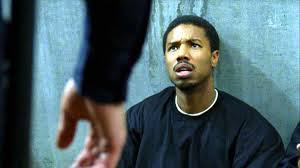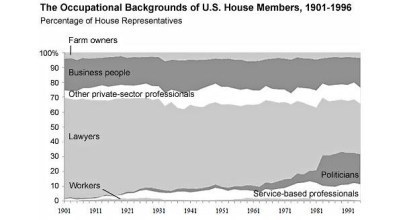Alon Shalev's Blog, page 11
August 13, 2013
Can I Order some Democracy, Please? – Tom Rossi
Once in a while, we hear, in the news, about a strange, mysterious concept known as “gerrymandering.” This is the practice whereby politicians make changes to the geographical shapes of political districts in order to give themselves and/or their political party more power. It’s done on an opportunistic basis by whichever party has power in a certain state at the moment and has no shame whatsoever.
However, in recent years the Republican Party has definitely taken the lead. The Dems are certainly not innocent, but they’ve taken a back seat to the recent flood of Republican gerrymandering.
How might it be possible to make more districts elect Republicans even if a majority of voters are Democrats? Here’s how:
First, identify geographic areas where Dems and Reps are concentrated. In other words, find areas that are not divided somewhat evenly, but where voting for one party is clearly dominant. Usually, this is as simple as separating the rich areas from the middle-class and poor neighborhoods. Then, draw new district borders, no matter how convoluted, around the desired areas, and voila’, you have cemented your power for the foreseeable future.
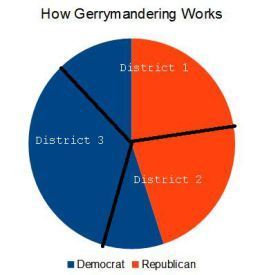
The Great State of Simplificatia
In the deliberately oversimplified diagram above (which is both a schematic and a fake map), you can see how gerrymandering works. The larger blue area (or population) votes Democrat, and the red area votes Republican. But if the Republicans set the districts, they can form one district that contains most of the Democrats, while the other two districts have a Republican majority. This means that, from this imaginary state with three congressional districts and a Democratic majority, one of the representatives that will be sent to Congress will be a Democrat, while two will be Republicans.
Due to various factors, people more often elect Republicans at the local level. This has to do with people’s (incorrect) perceptions about job creation, for one thing, but also the fact that many Democrats tend only to come out and vote in the “big” elections, for President of the United States, for example.
As a result, Republicans often end up in key positions of power from which they can control periodic redistricting. Of course, this phenomenon can and has taken place the other way ’round, but this is the dominant trend lately.
And it can be incredibly ugly on a real map:
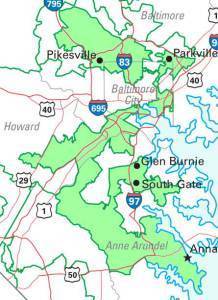
A single district in Maryland
What’s really politically beautiful (in reality, ugly) about this is that it provides the opportunity to whine about Democrats’ “making their seats safe,” even while, as I demonstrated in the diagram above, what’s really happening is the snatching of a seat by the Republicans.
For a much more detailed analysis of this problem, please read Sam Wang’s brilliant pieces: “Gerrymanders, Part 1: Busting the both-sides-do-it myth“, and “Part 2: How many voters were disenfranchised?” One conclusion that Wang reaches (with some good math and statistics) is that ten times as many Democrats have been disenfranchised as Republicans.
If it weren’t for this, Democrats would very likely hold the majority in the U.S. House of Representatives. That would mean that talk of austerity measures would die, as would talk of privatizing Social Security.
It would also mean that something might be done to prepare for climate change (that is already upon us) and maybe some steps would even be taken to minimize the amount and pace of climate change.
And get this… If Democrats really controlled the government, there would be less spending.
As Sam Wang suggests, gerrymandering disenfranchises voters. That means a hole in our democracy, and that’s unacceptable, whichever party benefits. With so much talk of “bringing democracy” to Iraq, Egypt, Afghanistan, and other countries, many are now saying, “Let’s bring democracy to the United States first.
Video: Stephen Colbert: Win, Lose, or Redraw
-Tom Rossi
___________________________________________________________________________
Tom Rossi is a commentator on politics and social issues. He is a Ph.D. student in International Sustainable Development, concentrating in natural resource and economic policy. Tom greatly enjoys a hearty debate, especially over a hearty pint of Guinness.
___________________________________________________________________________


August 9, 2013
Elves, Dwarves and Political Activists
“You can’t be serious!” she exclaimed, wrinkling her nose as though I had just made a pass at her, or uttered a politically incorrect sentiment. “You write about elves and dwarves running from one end of the world to another killing each other and making long speeches? I thought you were a serious writer.”
In honesty, she had not seen me for a few years, and even then, knew me in the context of my more political work environment. To her credit, she recovered and apologized, and I was able to refrain from pouring my drink into her lap. It was, after all, a good scotch.
 Friend or not, intentional or not, it still hurt. I thought I had passed this stage, smoothly presenting myself as ‘an author who writes in two genres’. I have practiced my opening line and it is now delivered with confidence.
Friend or not, intentional or not, it still hurt. I thought I had passed this stage, smoothly presenting myself as ‘an author who writes in two genres’. I have practiced my opening line and it is now delivered with confidence.
I am involved in social justice causes. Even in my short eight years living in the US, I have built a fair resume of involvement. I have taken students almost every year to New Orleans, not only to help rebuild a community, physically and emotionally, but to bear witness so that the millennials will not make the mistakes my generation did. I have been involved in various campaigns here and abroad. I know my local food bank well. Hey, you never had a black President before I came to the US!
But yes, I love to lose myself in Middle Earth, Alaegasia, Westeros and, dare I add it to the list: Odessiya. It’s a nice break from the intensive campus environment to deal with stubborn dwarves and idealistic elves. While closeted in an urban concrete jungle, I can escape on a horse and gallop through ancient forests, over great ice plains, and to quaff an ale or puff a pipe (without the health risks) with good friends, all from a computer screen or ebook reader.
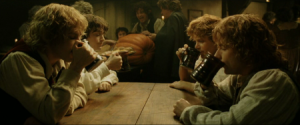 The San Francisco Bay Area is intensely populated by a variety of the human species often identified by salt-and-pepper haired, wrinkled, colorful attire, and provocative bumper stickers. These aging ideologues have rich resumes of demonstrating against wars, civil rights. Watergate, and more recently, more wars, gay rights, and gun control.
The San Francisco Bay Area is intensely populated by a variety of the human species often identified by salt-and-pepper haired, wrinkled, colorful attire, and provocative bumper stickers. These aging ideologues have rich resumes of demonstrating against wars, civil rights. Watergate, and more recently, more wars, gay rights, and gun control.
While there are many who have fallen by the wayside, succumbing to burnout, those who have maintained their energy to keep demonstrating and fighting for what is right, all seem to have a secret place they go to recharge, relax, and to return energized to help create a better world to live in. It might be literature, meditation, family, friends, food, nature … it doesn’t matter. As a friend once said: Fixing the world is a marathon, not a sprint.
Yeah, I write about elves and dwarves doing brave acts and striving for justice and honor. Sure I write about battles and loves, about friendships and magic, about the power of nature and good fighting evil.
It energizes me and often provides clarity and vision. And if I do occasionally wonder what Seanchai or Shayth might do about gun control or why some people are denied the rights and opportunities their neighbors have, well that’s because fantasy is not quite as far-fetched and detached from reality as my shocked friend might think.
God created the world in six days and on the seventh s/he rested…and may well have deservedly read Lord of the Rings.
Here’s to whatever it takes for each of us to continue the journey we’ve chosen!
—————————————————————————————————–
Alon Shalev writes social justice-themed novels and YA epic fantasy. He swears there is a connection. In celebration of the upcoming launch of Ashbar, the third in the Wycaan Master series, Tourmaline Books are offering for August only, the 2013 Eric Hoffer Book Award for YA - At The Walls Of Galbrieth - for 99 cents (kindle only).


August 8, 2013
A Nondescript Hero – Roger Ingalls
A few days ago I was thinking about teachers that influenced me in my younger years. There was Mrs. Bailey who introduced me and the rest of the second grade class to the Little House Series books written by Laura Ingalls Wilder. It turned a shy kid into a pseudo celebrity for a week or two and, as it turns out, I am actually related to the author. Then there was Ms. Lee from San Francisco; exotically pretty to a sixth grader. She opened my eyes to the goodness of ethnic diversity. I can still count in Cantonese…”yat, yee, sam, say, mm, lok, chat, baht, gow, sap, yatyat, yatyee and so on”.
The teacher that influenced me the most was Mr. X. Yes, that’s right, I can’t remember his name. It was the mid-seventies and the formalities of public schools were melting away. Most teachers tossed the traditional gender dress and became hip and cool. But not Mr. X, he wore black slacks, white shirt buttoned to the top and a dark unmarked tie. We thought he was a nerd and uncool, even the other teachers acted like he was a misfit. It was a time when educators were embracing friend-relations with students but not Mr. X. He kept a strict line between himself and us students. He was a teacher not a friend and we did what he told us to do; it was simple and straight forward.
Mr. X was a junior high school math teacher and I now believe a damn good one. When I moved onto high school, I was considered an advanced math student without ever trying to become one. I may not recall his name but I do remember that he focused us on one goal for that semester. We had to take the four numbers in our junior high graduating year (without rearranging their order) and make them equal 0, 1, 3, 4 and so on, all the way to 100. He would teach us different mathematical theories and then break us up into small groups and turn us loose on our one goal.
To get an idea of how we were to achieve our goal, here are some examples for the year 2013: 0=2+0+1-3, 1=|((2+0)x1))-3|, 2=2+(0x1x3) and so on up to 100.
Looking back on this some 30-something years later, it was brilliant. He made the class seem like a breeze because we only had to achieve one thing. The defined goal was made important to us because it was centered around the numbers used in the year we were graduating from junior high; it was personal, important and we owned it. Mr. X broke the class of thirty into five groups of six. The smaller groups made students more open to participation and simplified the teacher’s job because he could focus on five entities instead of 30 individuals. We achieved by working together; rehashing the theory which effectively created repetition in learning…we taught each other. Mr. X disguised his theory lessons by calling them hints for achieving the goal. He’d give us the theory and then we’d group up and apply what we learned to the goal and this deeply ingrained the lessons. It also groomed us for higher levels of schooling where lab work follows theoretical teaching. Without realizing it, we were taught some pretty complex math along with important workforce skills such as teamwork and cooperating to achieve goals.
Mr. X was not focused on or concerned about being cool, hip or friendly; he was focused on teaching. His methods were deceptively brilliant. He’s a nondescript hero and perhaps that was by design too.


August 7, 2013
Remembering Charlie Russell R.I.P
I was deeply saddened by the passing of Charlie Louis Russell, Jr. last month. I knew Charlie from the California Writer’s Club that we have both attended for many years. Charlie was a quiet, steady presence who was always interested and engaged in what was happening around him. He was generous in his encouragement and compliments, while always very humble about his own writing successes, as he was about his accomplishments and his brother.
What most impressed me was that he would never be drawn into compromising his work or cutting corners. He once said that it will take as long as it will take and if he didn’t finish it, then that was how it was meant to be. I guess his words were prophetic.
I hope he is up there in the great writer’s group in the sky, sitting with the greatest and working on his book. Those heavenly writers will enjoy his company as much as we did in the basement of the Oakland Public Library.
Below is his obituary.
Charlie Louis Russell, Jr.
March 10, 1932-June 28, 2013
Charlie Louis Russell, Jr. was born March 10, 1932 in West Monroe, LA. His parents, Charlie Russell, Sr. and Katie Russell, were hardworking, industrious, and ran a tight ship. They had a wood-burning stove and no indoor plumbing. He and his younger brother, William “Bill” Russell, spent days shooting BB guns, hunting birds, and going to the movies. The “Spy Masher” serial was a favorite. Charlie loved his mom’s cooking, especially her stuffed bell peppers and banana pudding.
Katie emphasized education. After discovering that Charlie had not learned to read in grade school, she insisted that he be held back. Katie spent the summer reviewing lessons with him, making sure he could read before the new school year.
In the 1940s, in search of a better life, the family moved to Oakland. Charlie attended Cole Elementary and Hoover Jr. High. Before she died, Katie used someone else’s address so he could go to Oakland Tech High, which she believed would better prepare him for college.
Charlie attended Santa Rosa JC. He was briefly married to Donna Diston. Their son Michael was born in 1950 (d. 2000). In the Army (1953-1955) Charlie was stationed in Korea. He returned and went to U.S.F., majored in English and was on the 1957 basketball team that reached the NCAA final four.
The Russell family’s westward migration was highlighted in Isabel Wilkerson’s book, The Warmth of Other Suns.
After college, Charlie moved to New York, married Tanya Johnson and they had a daughter, Katheryn (1961). He joined the Harlem Writers’ Guild and published several well-received pieces. His play, “Five on the Black Hand Side,” appeared off-Broadway and was made into a movie (1973). Charlie won an N.A.A.C.P. Image Award for writing the screenplay.
He earned an MSW degree from N.Y.U. in 1966 and was a counselor at City College.
Charlie loved jazz. Charlie Parker and Dinah Washington were his favorites.
He returned to the Bay Area in 1978 and taught drama at Contra Costa College. In the mid-1980s he moved to San Diego where he was a social worker. He moved back to the East Bay to manage the care of his father and worked for Ala. County Child Protective Services.
His final writing project was a novel based on Toussaint L’Ouverture’s life.
He leaves to cherish his memory daughter, Katheryn Russell-Brown (Kevin Brown), son, Joshua Russell, grandchildren, Louis Brown and Sasha Brown, special friend Sandra Johnson, ex-wife Tanya Russell, and many, many other family members and friends.
—————————————————————————————————–
Alon Shalev writes social justice-themed novels and YA epic fantasy. He swears there is a connection. His latest books include: Unwanted Heroes and the 2013 Eric Hoffer Book Award for YA - At The Walls Of Galbrieth. Alon tweets at @alonshalevsf and @elfwriter. For more about the author, check out his website.


August 6, 2013
The Many Faces of Terrorism – Tom Rossi
Terrorism is defined in Webster’s as, “The systematic use of terror, especially as a means of coercion.” But Google provides the definition that is closer to the common, popular understanding that also seems to dominate our legal landscape: “The use of violence and intimidation in the pursuit of political aims.”
The term “terrorism” is now haphazardly applied to anyone and everything whose activities are disliked by those in power, either in governmental or corporate settings. As a result, the term itself is used as a form of terrorism against those who would dissent, including the brave souls who have exposed extreme animal cruelty at factory farms and slaughterhouses.
Meanwhile, things that might justifiably be called terrorism are ignored, or even praised and rewarded. To illustrate this point, let’s look at a disturbing contrast…
The now infamous Tsarnaev brothers, Tamerlan and Dzhokhar, performed an act of classic terrorism. They set off bombs at the Boston Marathon, killing 3 people and injuring more than 250 – some seriously. They apparently did this as some sort of political statement that they were dissatisfied with America. What they hoped to accomplish I cannot imagine. Whatever their goal may have been, they most certainly (and predictably) failed.
After the Tsarnaevs were identified as the prime suspects, the city of Boston went to war, eventually “locking down” a huge area of the city and occupying it with all types of police vehicles, including some that resembled military tanks. The expense of this operation in democratic, financial, and economic terms, was immense.
As a result of an act committed by two inept, misguided clowns, we have given up even more of our freedom (both in the short and the long run), we have paid a large bill, and we have embarked on even more spending on security that will live on into the foreseeable future.
But what about the other, more insidious acts of terrorism that affect millions of Americans? What about the pollution of our drinking water and soil with substances that, among other impacts, have negative effects on fetal and child development? If a “terrorist” did that, if a person did it, it would be an outrage. There would be 24-hour television coverage for a week. There would be special logos and titles created by all the major news networks: “Terror at Your Kitchen Sink,” “Are You Safe in Your Own Home?” etc., etc., etc.
The truth is that the acts of terrorism I’m describing go on every day, have gone on for many years, and are rapidly accelerating. Under the guise (or justification) of increasing or cheapening our food supply or providing ever more cheap energy, untested (or sham-tested) chemicals have been dumped into our environment in incredible amounts. Weird and completely unnecessary chemical ingredients have also been added to our food, and toxic gases have been released into our air.
Regulations have been fought, tooth and nail, by the very terrorists committing these acts. We have been told, many times over, that regulating chemicals or even labeling our foods properly would raise prices or bring about shortages. The people of California were told that labeling genetically modified ingredients in processed foods would raise their grocery bills by $400 per year – a lie, but an effective lie.
How much does every American man, woman, and child pay each year for the “War on Terror?” It’s a difficult question to answer accurately, but a study from Brown University puts the figure at around $1,000 per year. That seems a conservative estimate. How much will our collective acts of terrorism cost in lost resources and lost health? That’s much more difficult, but you can bet it’s a whole lot more.
As a country, we are apparently more than willing to swallow almost limitless costs to fight one type of terrorism but downright intolerant of the very idea of stemming the type that can do far more damage to many more people. The Tsarnaev brothers certainly should have been pursued, caught, and punished (Tamerlan actually got killed trying to get away) for their cruel and idiotically pointless crime. Should we not also pursue and punish, as a society, what could be called “slow terrorism?”
It seems that if terrorists like the Tsarnaev brothers had been motivated by profit rather than making a political statement, instead of being hunted down like dogs, they would have been featured in business television shows and magazines. Maybe they would even have a commercial about how cool they are, narrated by a smart-looking woman in a white pants-suit.
-Tom Rossi
___________________________________________________________________________
Tom Rossi is a commentator on politics and social issues. He is a Ph.D. student in International Sustainable Development, concentrating in natural resource and economic policy. Tom greatly enjoys a hearty debate, especially over a hearty pint of Guinness.
___________________________________________________________________________


August 2, 2013
It was 99 cents!


Every year before going on our annual vacation, my family sit around the kitchen table for some intense negotiating as we decide which songs from the past year will find their place on the 201x family vacation playlist. The songs with the highest consensus are the first. This year’s number one choice was Macklemore & Ryan Lewis’s hilarious and anti-consumerism song – Thrift Shop – it was 99 cents!
It's all very well buying other people's ebooks for 99 cents: not so great when it is yours. Award-winning At The Walls Of Galbrieth is on sale for August to celebrate the third book of the Wycaan Master series that is due in September.
July 31, 2013
Next Stop – Fruitvale Station – Norm Weekes
I’d like to reach out of the screen of your laptop or phone and choke you by the throat until you promise to see the movie Fruitvale Station. But that would be wrong.
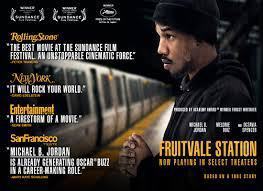 Fruitvale Station is the story of the murder of Oscar Grant by a BART policeman early New Year’s Day 2009. The audience gets to ride along with Oscar on his last day and reveals the imperfect but very human Oscar Grant. This is not a movie review. For the record it’s a stunning piece of filmmaking from the Bay Area’s own first time feature film director Ryan Coogler.
Fruitvale Station is the story of the murder of Oscar Grant by a BART policeman early New Year’s Day 2009. The audience gets to ride along with Oscar on his last day and reveals the imperfect but very human Oscar Grant. This is not a movie review. For the record it’s a stunning piece of filmmaking from the Bay Area’s own first time feature film director Ryan Coogler.
 Fruitvale Station also won the Grand Jury prize at Sundance so it’s not just me talking that talk. This transcends entertainment and becomes part of the discussion we won’t have about race in America. It’s the part of the race discussion about African American males as discounted, devalued and people to fear. Hard to emphasize with people you fear. If your empathy is missing Fruitvale Station will help you find it. Here is an opportunity through the art of cinema to understand a segment of your community that you probably don’t know, may be terrified of and have trouble relating to.
Fruitvale Station also won the Grand Jury prize at Sundance so it’s not just me talking that talk. This transcends entertainment and becomes part of the discussion we won’t have about race in America. It’s the part of the race discussion about African American males as discounted, devalued and people to fear. Hard to emphasize with people you fear. If your empathy is missing Fruitvale Station will help you find it. Here is an opportunity through the art of cinema to understand a segment of your community that you probably don’t know, may be terrified of and have trouble relating to.
Unless you work or live with the peeps you just know us from music, movies and News at 11. President Obama broke through the noise a bit in his “Listen Up White People” speech after the Trayvon Martin verdict but there will be no follow up. We always talk about having a discussion about race and never do it. I too am complicit. I think after the age of 12 it’s a useless conversation to have. The reason the Trayvon, Oscar and a long line of young African American men get murdered is because we’re demonized, stereotyped and dehumanized as part of the narrative. And the reason this continues is because we don’t know each other as people. We don’t break bread together, worship together or play together.
Fruitvale Station allows you, the good meaning person who is not racist but doesn’t really care about African Americans, a chance to relate without going through the trouble of actually having to spend time with us. It can’t get any more convenient than that. Want to get to know black folk without spending time with them? There’s a not an app for that but there’s a movie for that!
By the end of Fruitvale Station you’ll be balling your eyes out because you’ll know you have more in common with Oscar Grant and his family than you thought possible. Black kids have been killed and devalued in our society for longer than I can remember. See Fruitvale Station so the next time a cop, gang banger or neighborhood watchman executes an unarmed black kid you’ll feel the dimension of the tragedy.
If you want to connect with your fellow Americans start the trip at Fruitvale Station.
——————————————————————————————————
Norm Weekes lives in the East Bay and volunteers with non-profits working in social justice and digital literacy. He is a volunteer at The Mentoring Center and Oakland Digital.


July 30, 2013
Politicians are Uneducated – Tom Rossi
Our politicians are not, generally speaking, morons. Most are actually of above average intelligence, and that’s true regardless of party affiliation. But the backgrounds of most politicians, both educational and experiential, are narrow.
Most politicians are lawyers. Getting a law degree and passing the Bar Exam is no mean feat, but it doesn’t prepare a person to face the types of issues that now bombard politicians at many levels of government – climate change, “super-bugs,” genetically engineered organisms, fracking, etc. These are scientific issues, or issues that at least require a scientific perspective.
In this millennium, politicians who have only been educated in the law and/or business are making decisions on issues they know nothing about, that’s obvious. But what bothers me more is that the education and experiences of politicians have not even given them the intellectual tools necessary to process scientific information.
The concept here is really not too difficult. Would you want an expert in French impressionism to come over and fix a problem with the electrical wiring in your house? I suppose there might be a French impressionism expert who also once worked as an electrician, but someone like that is probably just a wee bit hard to find. Why would you want an expert in corporate law to make decisions about the food you eat and how it gets to your plate? Why would you want an expert in constitutional law to make decisions about practices that will make a lot of money, but badly pollute our water? Why would you want an expert in franchise and distribution law to make decisions affecting the fate of the entire human race?
Technically, a “moron” is defined as a person whose IQ falls between 51 and 70 points. A moron could hardly pass the bar, nor could he or she easily become a captain of business (the second-leading source of our politicians). But a person can easily be made to look dumb if they are placed in a situation about which they know almost nothing.
Do you want to see an apparent moron? Ask me to fix your plumbing, or your teeth, or balance the books for your corporation. I can’t do any of these things, despite the fact that I do have the necessary intelligence (my mom sez I is real smart, an’ hansum too!). I have no training in these areas. I haven’t read a book about them or even watched a Youtube instructional video!
This lack of scientific training among our politicians might have been OK (well, not really) 50 or 100 years ago. Here in the third millennium, A.D., our leadership needs to go back to school. Either that or we need to have some scientific prerequisites for our elected officials, well beyond the general education requirements of most colleges.
Politicians need to know something about the scientific method and about scientific processes. It would also be very helpful for them to have some experience in the debates that go on between scientists, so that they can get an understanding of just what types of disagreements are given validity in the scientific world – the rules are very different from the rules of evidence in a court of law.
This would be government reform with real meaning. Now where’s that television repair person? I need some music lessons.
-Tom Rossi
___________________________________________________________________________
Tom Rossi is a commentator on politics and social issues. He is a Ph.D. student in International Sustainable Development, concentrating in natural resource and economic policy. Tom greatly enjoys a hearty debate, especially over a hearty pint of Guinness.
___________________________________________________________________________


July 27, 2013
Sex or Swords?




I recently finished an epic fantasy novel by an author who is perhaps a year ahead of me. He has a couple of novels deeper into his series and seems to have a similar, but not bigger, social platform.
But his books are selling impressively and I enjoyed reading his work, but there was nothing in the quality of the plot, writing, etc.
Lot of discussion about what is appropriate to expose to our teenagers - is it better to prevent or control the message?
July 25, 2013
Jail for the Privileged and Profiteers – Roger Ingalls
Another city jail opens its doors to corruption. Fremont, California over build their incarceration capacity by a factor of six so now they’ve decided to lower their vacancy rate by renting out the open cells in an attempt to turn a quarter of a million dollar profit. On the surface it sounds like a good idea because the city fixes a planning mistake and they also make money to spend elsewhere. But these profit motivated jailing programs have proven corrupt and beneficial to mainly the privileged.
Obviously, these programs cater to the wealthier members of society. As an example, if someone breaks the law and is sentenced to jail time, instead of serving time in a crowded county jail they can appeal to the judge for movement to a city facility if they pay a daily rental fee. In the case of Fremont, the daily fee is $155. If you have extra money, you can buy your way into a nicer jail with fewer prisoners and a less stressful environment. So, two criminals with the same offence with different monetary standings will serve different sentences. The poorer guy gets hell while the richer one gets a more privileged stay. Sentencing for crime should not be based on a criminal’s wealth.

picture by thinkprogress.org
Another problem with for profit jails is financial corruption. Again, it’s already been proven that judges can get bought. A for profit juvenile jail in Pennsylvania kicked back $2.6 million to two judges for keeping their facility at capacity; the infamous Kids for Cash Scandal. Offences that normally resulted in suspension from school for a few days often put teenagers in juvy-jail for months. The judges hid behind a position of zero tolerance but in actuality it was payola time.
For profit incarceration is also driving the criminalization of basic human behavior. Many of the prisons built over the past twenty years are constructed and managed by companies on the stock exchange. Many facilities originally built by local governments are now being handed over to for profit companies. Do you wonder why crime reports state that violent crimes are down but then the next report says the prison population is increasing? To attract stock investors, publicly traded incarceration companies need to grow revenue quarterly and annually…that’s how Wall Street and their financial institutions work. More prisoners equal more dollars and rehabilitation is a dirty word. These huge prison companies and their large work force hire lobbyists and political marketing firms to promote the passing of new laws or rally against movements that try to do away with bad laws that criminalize normal human behavior. Again, these companies need bodies behind bars to make money.
Jailing for the purpose of profit is a corruption of justice.










